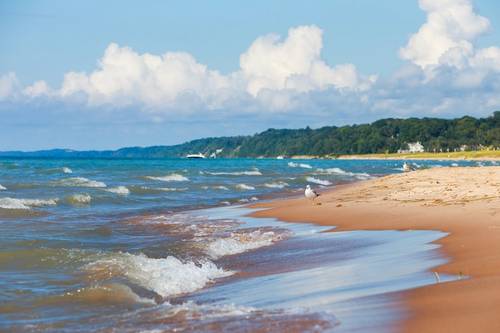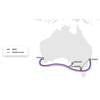US Announces $575 Million for Coastal Climate Resilience
The U.S. Department of Commerce announced its first-ever Climate Resilience Regional Challenge, which will provide $575 million in funding through President Biden’s Investing in America agenda to help coastal and Great Lakes communities, including tribal communities in those regions, become more resilient to extreme weather and other impacts of the climate crisis. The Challenge is the first and largest funding opportunity released under the $2.6 billion Inflation Reduction Act climate resilience framework that the Department unveiled in June. “Through this first-ever regional approach to strengthening climate resilience, the Biden-Harris Administration is ensuring that communities across the country, especially underserved communities, have the resources they need to prepare for the growing impacts of the climate crisis,” said U.S. Secretary of Commerce Gina Raimondo. “As part of President Biden's Investing in America agenda, the Climate Resilience Regional Challenge will help communities that share common challenges work together to develop innovative solutions while equipping them with essential resources to build a climate-ready future.”
The competitive grant program has two distinct tracks for investing in holistic, collaborative approaches to coastal resilience at regional scales. Track One will support Regional Collaborative Building and Strategy Development ($25 million), with a focus on laying the groundwork for future resilience efforts. Track Two will support the Implementation of Resilience and Adaptation Actions ($550 million), with a focus on implementing transformational climate adaptation actions.
Investments are geared to benefit coastal and Great Lakes communities, including tribal communities and those that are marginalized, underserved and underrepresented. While the new investments will complement existing investments in coastal resilience, the Climate Resilience Regional Challenge is unique in its focus on building enduring capacity within and across regional networks and its holistic approach to climate resilience. With NOAA technical support and assistance, this collaboration and coordination across regions will help coastal communities prepare for climate change, reduce risks and address vulnerabilities.
“While every coastal community feels the effects of climate change, many lack the resources and infrastructure they need to become climate-ready,” said NOAA Administrator Rick Spinrad, Ph.D. “Thanks to President Biden’s commitment to bolstering climate resilience, we are helping more coastal communities move toward action on climate resiliency efforts, which is an important first step — and in areas where the groundwork is already laid, NOAA is ready to support communities in taking action. This multi-faceted approach allows us to meet people where they are and help regional resilience efforts move forward.”
Across both competition tracks (Regional Collaborative Building and Strategy Development and Implementation of Resilience and Adaptation Actions), there are three program priorities:
- Climate Risk Reduction.
- Equity and Inclusion.
- Enduring Capacity.
The Regional Collaborative Building and Strategy Development fund is designed to support the following activities, including help with:
- Building and expanding regional partnerships.
- Engaging and partnering with tribes and marginalized, underserved, underrepresented communities.
- Assessing risk and vulnerability.
- Planning resilience strategies and adaptation actions.
- Building community and workforce capacity for climate adaptation efforts.
The Implementation of Resilience and Adaptation Actions fund is designed to support regionally significant actions such as:
- Acquiring vulnerable land.
- Building natural infrastructure.
- Improving public infrastructure’s resilience.
- Strengthening or protecting public access to coastal natural resources.
- Building regional capacity for ongoing actions that increase resilience.
- Planning and preparing for community-led relocation.
- Updating state and local codes and policies.
“The Challenge provides an unprecedented opportunity to work hand-in-hand with communities to develop tailored solutions that reduce risk and address coastal climate-related hazards,” said Nicole LeBoeuf, director of NOAA's National Ocean Service. “This investment will help align resources at the federal, state, tribal and regional levels, while emphasizing access for underserved communities — ensuring that all Americans benefit from this transformative approach to building resilience.”
The announcement is part of President Biden’s Investing in America agenda, which is growing the American economy from the middle-out and bottom-up — from rebuilding our nation’s infrastructure to driving over $470 billion in private sector manufacturing and clean energy investments in the United States, to creating good-paying jobs and building a clean-energy economy that will combat climate change and make our communities more resilient.




![Microplastic beads seen in the central tube of a copepod [their intestinal tract], as evidenced here, fluorescently labelled beads help with visualization and identification. © PML](https://images.marinetechnologynews.com/images/maritime/w100h100padcanvas/microplastic-beads-seen-166795.jpeg)











 December 2025
December 2025



